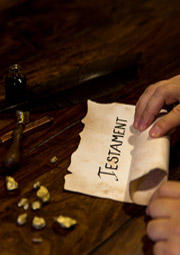Legal Wills - Free Will Forms
Along with our free legal will forms we provide guidelines
on how to write a will.
We also address the content a will should contain, with specific information on choosing an executor, guardian etc.
If you still find yourself unsure about the wording in our templates, a review of the most frequently asked questions may be of help.

Here we take a look at last will and testament laws in some unusual situations that some people may be faced with.
Note: Links to a variety of free legal wills can be found on our main Last Will and Testament page.
How Should a Blind Person go about Making a Will?
A blind person could read his/her will by using computer software or special glasses OR by having it read to him/her by another person. If read by another person, the following must then be added to the standard Last Will and Testament clause:
- Attestation Clause of the Witnesses -
"We further declare that the entire document was read to the testator ___________________, a blind person, in the presence of the undersigned witnesses. The testator confirmed fully understanding the will and that he/she approved the content, prior to his/her signing of the will." - The creator of the will can also have the following added to his/her declaration -
"I confirm that being a blind person, the document was read to me prior to my signing and I am satisfied that it was read accurately." - A Notary Public could add -
"I further testify that I read this Last Will and Testament to _________________ prior to his signing and the notarization."
This is a good occasion to have a video recording made!
Important Note: Getting legal advice on wills for people who are blind, illiterate, unable to understand the language or with a pertinent disability is highly recommended!
Can a Person Suffering from Dementia Execute a Will?

This will most often arise in the elderly where there is a loss of mental capacity due to age or disease.
However, such an elderly person may have periods of lucidity (lucidum intervallum) and as such will have testamentary capacity at that time.The test for mental capacity to make a valid will is far less stringent than, for example, being able to handle his/her own affairs or to enter into a complex contract.
Although this may vary from one jurisdiction to another, generally the test would be whether the will maker:
- Is capable of understanding and appreciating the nature and consequence of the act of making a will;
- Has understanding of the nature, extent and value of his/her estate and is able to dispose of it in a coherent way;
- Can make rational decisions about natural beneficiaries and heirs.
Where there is suspicion that a beneficiary exerted undue influence over a testator, family members or other interested parties need to seek legal advice on wills in order to contest any such bequest.
Having the execution of a will documented on video can help to prove that a testator answered questions (about the contents of his/her will, the bequests and the beneficiaries) with lucidity.
Can I Make Provision for Pets in a Will?

The short answer is yes, but you need to follow last will and testament laws to ensure your wishes are executed.
Firstly, you cannot name pets as beneficiaries because they do not have the legal capacity to have ownership of property or assets.
However, there are other ways to include pets in your will:
- You can leave your pets as property to another person and bequeath money or other assets to this person to make provision for the care of your pets.
- In some jurisdictions you can create a testamentary pet trust. In this instance you will name a caretaker for your pet and appoint a trustee who will provide funds from your estate to the caretaker, for the continued care of your pet.
Legal Wills - Frequently Asked Questions
Can a person suffering from dementia execute a will?
How do I provide for my pet in a will?
How does a blind person make a will?
What is meant by "Power of Assumption"?
What does it mean to furnish security or a bond?
Can I refuse an inheritance?
Can a blind person sign as witness?
Where should I store my will?
Can I have more than one original copy?
How do I finalise my online accounts?
Can I disinherit a child or spouse?
What can make a will invalid?
Can a person be disqualified from inheriting?
Can another person sign on behalf of a testator?
What is a testamentary trust?
Is a holographic will (handwritten will) legal?
Can I have an international will?
How does contesting a will work?
You are here:
- Legal Documents »
- Writing a Will »
- Family Wills »
- FAQ's Part 2




